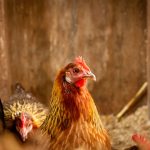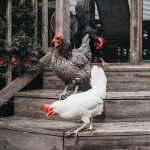Broiler chickens have specific requirements that must be met for optimal growth and health. These birds thrive in a comfortable, stress-free environment with controlled temperature conditions. Broilers are sensitive to temperature fluctuations and require a warm, dry setting to maintain their health.
Access to clean water and a nutritionally balanced diet is essential to support their rapid growth rate. Adequate space for movement and wing-stretching is crucial, as overcrowding can lead to stress and health problems. Protection from predators and adverse weather conditions is vital for broiler chickens.
They are vulnerable to attacks from various predators, including foxes, raccoons, and birds of prey. A secure shelter is necessary to ensure their safety. Additionally, broilers need protection from extreme weather conditions such as heavy rain, strong winds, and temperature extremes.
Their housing should provide shelter from the elements while maintaining proper ventilation. Understanding and meeting these needs is fundamental to successful broiler farming and ensuring the birds’ overall well-being and productivity.
Table of Contents
Key Takeaways
- Broiler chickens require a comfortable and stress-free environment to thrive and grow efficiently.
- Adequate shelter and clean, dry bedding are essential for broiler chickens to maintain good health and prevent diseases.
- Supplemental heat sources such as heat lamps or heaters may be necessary to keep broiler chickens warm, especially in colder climates.
- Monitoring temperature and humidity levels is crucial to ensure that broiler chickens are kept in optimal conditions for growth and development.
- Proper ventilation is important to maintain good air quality and prevent respiratory issues in broiler chickens.
- Implementing feeding and watering strategies that provide easy access to food and clean water is essential for the health and well-being of broiler chickens.
- Regular health checks and veterinary care are necessary to detect and prevent any potential health issues in broiler chickens.
Providing adequate shelter and bedding
Shelter Requirements
The shelter should be spacious enough to allow the birds to move around freely and should provide adequate ventilation to prevent the buildup of harmful gases. Additionally, the shelter should be designed to allow for easy cleaning and maintenance to ensure a hygienic environment for the broiler chickens.
Importance of Bedding
In addition to a suitable shelter, providing proper bedding is crucial for the comfort and health of broiler chickens. Bedding materials such as straw, wood shavings, or shredded paper provide insulation and cushioning for the birds, helping to keep them warm and comfortable.
Maintenance and Hygiene
The bedding should be kept clean and dry to prevent the growth of harmful bacteria and fungi that can cause respiratory issues and other health problems in broiler chickens. Providing adequate shelter and bedding is essential for creating a safe and comfortable environment for broiler chickens to thrive.
Using supplemental heat sources

Broiler chickens require supplemental heat sources, especially during the early stages of their growth. Chicks are particularly sensitive to temperature changes and need a warm environment to stay healthy and active. Using supplemental heat sources such as heat lamps or brooders can help maintain the ideal temperature for the chicks.
It is important to place the heat sources at a safe distance from the chicks to prevent overheating or burns. Additionally, it is crucial to monitor the temperature regularly and adjust the heat sources as needed to ensure that the chicks are kept warm and comfortable. Furthermore, providing supplemental heat sources is essential during cold weather or in regions with low temperatures.
Broiler chickens are susceptible to cold stress, which can lead to reduced growth rates and increased susceptibility to diseases. Using supplemental heat sources in the chicken coop or housing structure can help maintain a comfortable temperature for the birds, promoting healthy growth and development. Understanding the importance of supplemental heat sources is crucial for providing a suitable environment for broiler chickens.
Monitoring temperature and humidity levels
Monitoring temperature and humidity levels is essential for the health and well-being of broiler chickens. These birds are sensitive to temperature changes and require a warm and dry environment to thrive. It is important to regularly monitor the temperature in the chicken coop or housing structure using thermometers or temperature sensors.
The ideal temperature for broiler chickens varies depending on their age, with chicks requiring higher temperatures than older birds. Maintaining the appropriate temperature is crucial for promoting healthy growth and preventing cold stress in broiler chickens. In addition to temperature, monitoring humidity levels is also important for the health of broiler chickens.
High humidity levels can lead to the buildup of moisture in the chicken coop, creating a damp environment that is conducive to the growth of harmful bacteria and fungi. On the other hand, low humidity levels can cause dryness and respiratory issues in broiler chickens. It is important to monitor humidity levels using hygrometers and take measures to maintain optimal levels for the birds’ well-being.
Regularly monitoring temperature and humidity levels is crucial for creating a comfortable and healthy environment for broiler chickens.
Ensuring proper ventilation
Proper ventilation is essential for maintaining a healthy environment for broiler chickens. Good ventilation helps remove excess moisture, ammonia, and other harmful gases from the chicken coop or housing structure, promoting air quality and preventing respiratory issues in the birds. It also helps regulate temperature and humidity levels, creating a comfortable environment for the broiler chickens.
Proper ventilation is particularly important in preventing heat stress during hot weather and maintaining air circulation during cold weather. Furthermore, proper ventilation helps prevent the buildup of odors and airborne pathogens that can cause diseases in broiler chickens. It is important to design the chicken coop or housing structure with adequate ventilation openings such as windows, vents, or fans to ensure proper air circulation.
Regularly cleaning ventilation openings and removing any obstructions is also crucial for maintaining good airflow in the chicken coop. Ensuring proper ventilation is essential for creating a healthy and comfortable environment for broiler chickens to thrive.
Implementing feeding and watering strategies

Nutritional Requirements
Broiler chickens require a balanced diet that provides essential nutrients such as protein, carbohydrates, vitamins, and minerals to support their rapid growth. It is important to provide high-quality feed formulated specifically for broiler chickens to ensure that they receive all the necessary nutrients for healthy development.
Watering Strategies
Providing access to clean water at all times is crucial to prevent dehydration and support proper digestion in broiler chickens. Implementing feeding strategies such as regular feeding times and portion control can help prevent overeating and promote healthy growth in broiler chickens.
Optimizing Feeding and Watering Systems
It is important to monitor feed consumption and adjust feeding amounts as needed based on the birds’ growth rate and appetite. Providing access to feeders and waterers that are suitable for the size of the flock can help prevent competition and ensure that all birds have equal access to food and water.
Regular health checks and veterinary care
Regular health checks and veterinary care are essential for ensuring the well-being of broiler chickens. Monitoring the health of the birds regularly can help detect any signs of illness or disease early on, allowing for prompt intervention and treatment. It is important to observe the behavior and appearance of the birds, checking for any signs of lethargy, abnormal posture, respiratory issues, or changes in appetite.
Additionally, regular physical examinations by a veterinarian can help assess the overall health of the flock and identify any potential health issues. Furthermore, implementing vaccination programs as recommended by a veterinarian can help prevent common diseases in broiler chickens, reducing the risk of outbreaks and promoting overall flock health. It is important to follow proper biosecurity measures to prevent the introduction of diseases into the flock and maintain a hygienic environment in the chicken coop or housing structure.
Regular health checks and veterinary care are crucial for ensuring that broiler chickens remain healthy and free from diseases, supporting their growth and well-being. In conclusion, understanding the specific needs of broiler chickens is crucial for creating a suitable environment for their growth and well-being. Providing adequate shelter and bedding, using supplemental heat sources, monitoring temperature and humidity levels, ensuring proper ventilation, implementing feeding and watering strategies, and regular health checks are all essential components of successful broiler farming.
By meeting these needs, broiler farmers can promote healthy growth and development in their flocks while ensuring their overall well-being.
If you’re looking for tips on how to keep broiler chickens warm, you may also be interested in learning about the size requirements for a chicken coop. Check out this article to ensure your chickens have enough space to stay comfortable and healthy.
FAQs
What are broiler chickens?
Broiler chickens are a type of chicken that are specifically bred and raised for meat production. They are typically raised in large numbers in commercial poultry farms.
Why is it important to keep broiler chickens warm?
Broiler chickens are sensitive to temperature changes and can suffer from cold stress, which can lead to reduced growth, increased mortality, and overall poor health. Keeping broiler chickens warm is essential for their well-being and optimal growth.
What are some ways to keep broiler chickens warm?
Some ways to keep broiler chickens warm include providing adequate insulation in the chicken coop, using heat lamps or brooder heaters, ensuring proper ventilation to prevent moisture buildup, and providing enough bedding for the chickens to nestle in.
What temperature range is ideal for broiler chickens?
The ideal temperature range for broiler chickens is between 90-95°F (32-35°C) during the first week of life, and then gradually decreasing by 5°F (2-3°C) per week until reaching a range of 70-75°F (21-24°C) by the time they reach 6 weeks of age.
What are the signs of cold stress in broiler chickens?
Signs of cold stress in broiler chickens include huddling together, reduced activity, decreased feed intake, and shivering. It’s important to monitor the chickens for these signs and take appropriate measures to keep them warm.
Meet Walter, the feathered-friend fanatic of Florida! Nestled in the sunshine state, Walter struts through life with his feathered companions, clucking his way to happiness. With a coop that’s fancier than a five-star hotel, he’s the Don Juan of the chicken world. When he’s not teaching his hens to do the cha-cha, you’ll find him in a heated debate with his prized rooster, Sir Clucks-a-Lot. Walter’s poultry passion is no yolk; he’s the sunny-side-up guy you never knew you needed in your flock of friends!







